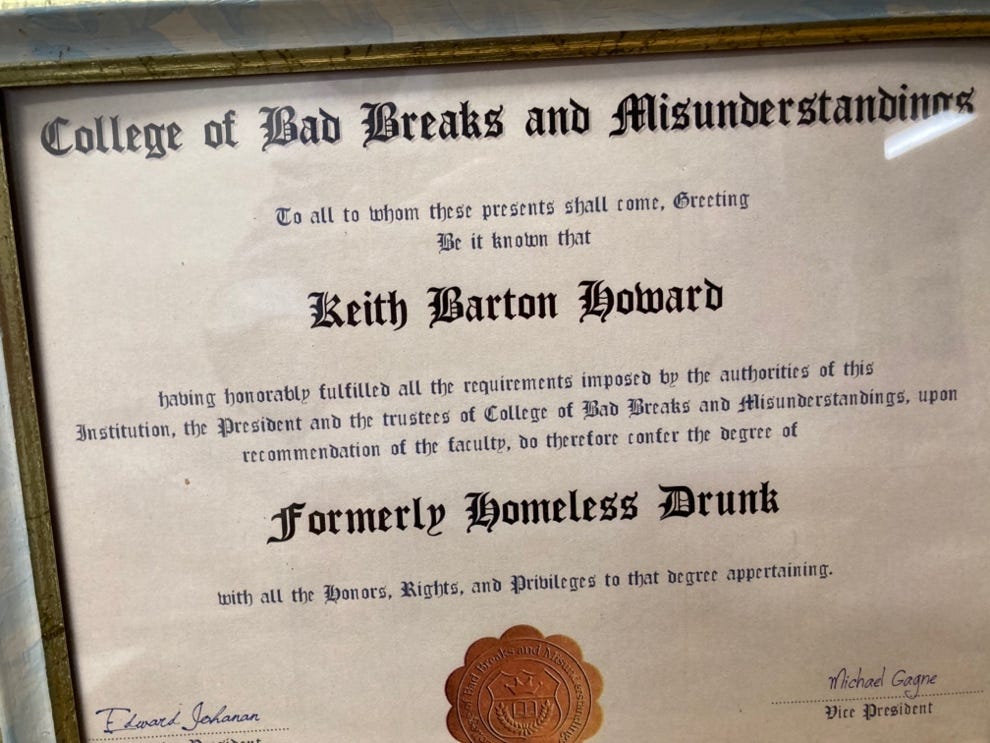Let me be clear: I’m not against education. That’s not exactly a bold stance, I know. I’m also not opposed to certifications. If someone’s going to snake my sewer line, I’d prefer they know a wrench from a woodchuck. Credentials have their place.
So do hierarchies. As a veteran, I understand them well. In the military, I was an E-5—just high enough to feel important, just low enough to be ignored. My spot in the pecking order was clear: above a few, beneath many, and buried under the weight of a chain of command that stretched from my company commander all the way to the President.
In that world, hierarchy made sense. If you’re sending people into battle, it’s important to know whose orders to follow—and to follow them without hesitation.
But here’s the thing.
Recovery isn’t war.
Or if it is, it’s a war you don’t win by saluting the smartest guy in the room.
The clinical model of addiction treatment is another structured pyramid: the PhD psychologist outranks the MLADC, who outranks the LADC, who outranks the CRSW. That alphabet soup might sound impressive, but all it ever gave me was indigestion.
Before I found recovery, I cycled through more therapists than I can count. All of them were credentialed. Some were kind. But none of them got through to me—not really. Why?
Because I was running a two-part scam:
I’d be totally honest about anything that wasn’t connected to my drinking or drugging, and
Everything in my life was connected to my drinking or drugging.
In other words, I never told the truth. Not the full truth. Not the operative truth. I told the version that kept me safe from change.
And none of them called me out.
Maybe they knew I was lying. Maybe they didn’t. Maybe I was just that convincing—a master of the confessional half-truth, the tragic-but-teachable anecdote.
Or maybe I was just another Thursday at 3:15.
When I finally got sober, it wasn’t through a diagnosis or a treatment plan or a laminated workbook. It wasn’t because someone with a degree cracked my personal code.
It was because I met a roomful of people who had nothing to prove and everything to share.
They’d been where I’d been. They knew what it felt like to come to in a panic, to lie reflexively, to pray for a painless exit and wake up disappointed. They didn’t flinch. They didn’t analyze. They didn’t ask for my insurance card. They just told the truth—messy, funny, brutal truth—and expected me to do the same.
If the clinical model is a pyramid, recovery—real recovery—is that pyramid after a dinosaur stomped through it, burped on the rubble, and wandered off toward extinction. The structure isn’t just flattened; it’s obliterated.
There are no ranks. No robes. No special seating for the spiritually advanced.
Just a circle of chairs.
I didn’t need a professional. I needed a peer. Someone who looked me in the eye and saw through the bravado and the shame. Someone who didn’t blink when I confessed the things I swore I’d never say out loud.
That’s what saved my life.
I do, for the record, have an advanced degree. And a certification. I took the course, did the follow-up training, passed the multiple-choice exam. I’ve got the piece of paper to prove it.
But none of that made me helpful to anyone. None of that built rapport. None of that earned trust. Degrees don’t do that. People do.
The real certificate is in the picture accompanying this piece. Made by some vets at a place I ran for five years, it says simply, that I am a Formerly Homeless Drunk. It may have been a gag, but it was a gag of gold.
Playing piano doesn’t make you a dog trainer. Knowing theory doesn’t make you trustworthy. In the end, the credentials might get you a job, but they won’t get you into someone’s heart. Or their pain. Or their hope.
I can’t tell you what will work for you. I’m not in the advice business. I’m in the been-there business. What worked for me was a ragtag group of wounded weirdos who weren’t afraid of the dark because they’d lived in it too. We found a common solution, forged a common purpose, and helped each other taste life again—before it slipped away, or dried up, or turned to ash in our mouths.
That’s recovery. At least for me.
No pyramids. No ranks. Just us.




